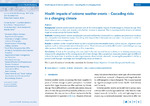Health impacts of extreme weather events – Cascading risks in a changing climate
Butsch, Carsten
Beckers, Liza-Marie
Nilson, Enno
Frassl, Marieke
Brennholt, Nicole
Kwiatkowski, René
Söder, Mareike
Background: Extreme weather events represent one of the most tangible impacts of anthropogenic climate change. They have increased in number and severity and a further increase is expected. This is accompanied by direct and indirect negative consequences for human health.
Methods: Flooding events, storms and droughts are analysed here for Germany from a systemic perspective on the basis of a comprehensive literature review. Cascading risks beyond the initial event are also taken into account in order to depict downstream consequences.
Results: In addition to the immediate health burdens caused by extreme weather events, such as injuries, long-term consequences such as stress-related mental disorders occur. These stresses particularly affect certain vulnerable groups, e.g. older persons, children, pregnant women or first responders.
Conclusions: A look at the cascading risks described in the international literature allows us to develop precautionary measures for adaptation to the consequences of climate change. Many adaptation measures protect against different risks at the same time. In addition to planning measures, these include, above all, increasing the population's ability to protect itself through knowledge and strengthening of social networks.
This is part of a series of articles that constitute the German Status Report on Climate Change and Health 2023.
Dateien zu dieser Publikation

